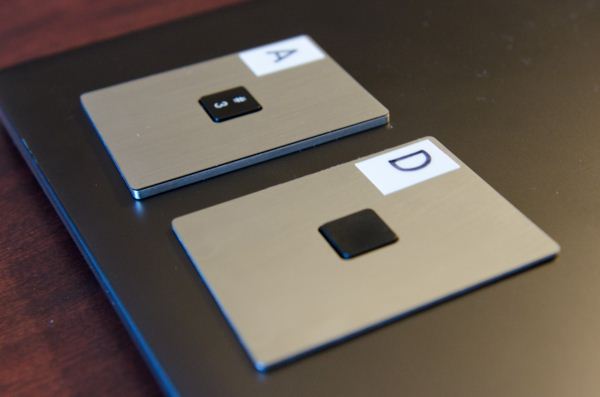
Original Link: https://www.anandtech.com/show/6172/synaptics-thintouch-bringing-the-capacitive-touch-revolution-to-mechanical-keyboards
Synaptics ThinTouch: Bringing the Capacitive Touch Revolution to Mechanical Keyboards
by Anand Lal Shimpi on August 20, 2012 9:00 AM EST

Earlier this month Synaptics announced the acquisition of Pacinian, a company that focused on physical keyboards that used capacitive touch. To expand, Synaptics has to look beyond clickpad and capacitive touch controllers into adjacent markets. The keyboard industry made sense and it’s ripe for innovation.
Based on Pacinian’s research into capacitive keyboards, Synaptics is announcing ThinTouch - a capacitive keyboard that promises a thinner profile and similar performance to a standard mechanical keyboard.
ThinTouch uses capacitive sensing to determine when a key is pressed, while still allowing the key to move. In a normal keyboard, you press down on a key, it travels perpendicularly to the keyboard and actuates a switch or sensor. ThinTouch gives you the impression of similar travel distance, but instead of going straight down it actually travels diagonally towards you. By moving at an angle the key travels the same physical distance, but in a smaller z-height. There’s some more materials trickery afoot that makes the process feel like a normal keyboard, but we won’t get to talk about that for another few months.
Since there’s no switch below the surface of the key, backlighting becomes an easier problem to solve. With a simpler mechanical setup there’s also potential for an improvement in durability.

Thickness reduction from a standard chicklet to ThinTouch keyboard, the feel is pretty similar
Synaptics had four demo keys set out, one from an Apple keyboard, one from an Acer and two using ThinTouch. The ThinTouch keys didn’t feel identical to those from the Apple and Acer notebooks, but they were relatively close and not necessarily worse. I’d still have to feel an entire keyboard made out of ThinTouch keys to be convinced, but the effect is pretty impressive.
The reduction in thickness due to implementing ThinTouch can be significant. Synaptics is promising up to a 50% thinner keyboard design. Even if that’s at the upper bound of what’s possible, any reduction in keyboard thickness can directly translate into more room for cooling, larger batteries or allow for a thinner notebook.
Things get really exciting when you start exploiting the fact that individual keys are touch sensitive. A notebook could sense where your hands are, offer more sophisticated text prediction, etc... While I wasn’t completely sold on ForcePad, ThinTouch is really exciting to me. It’s clear physical keyboards aren’t going away, so real innovation in this space is much needed.














